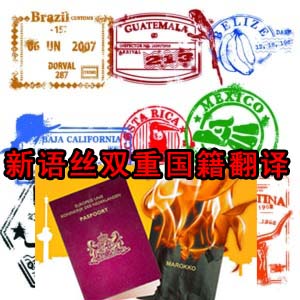据新语丝北京翻译公司了解,双重国籍翻译是一个人通过程序取得两个国家的国籍申请翻译,双重国籍翻译在国际公法上是负有忠诚义务的根据,同样受到法律保护和认可。
双重国籍翻译也是入籍翻译的一种,都是以国籍翻译为目的,双重国籍翻译和入籍翻译并不冲突。
在众多的国家中,菲律宾接受双重国籍,也促成了双重国籍翻译。
在一个史无前例的法案中,菲律宾政府首次颁布了《公民保留和重新获得法案》。根据此法案,数十年来一直奉行的双国籍菲律宾公民禁令被废止。菲律宾国会认识到,在当今世界,菲律宾人已经遍布全球,有些甚至已经加入其它国家的国籍,同时与其在菲律宾的朋友、传统和家人保持着紧密的联系。
不幸的是,在此法案颁布之前,加入其它国家(如美国)国籍的人就不能再保持原来的菲律宾国籍。菲律宾国会意识到,这严重影响到海外菲律宾人与国内菲律宾人的团结。同时也导致原菲律宾公司在菲律宾的投资遭受损失。
新法案适用于所有由于加入其它国家国籍而失去菲律宾国籍的人重新获得菲律宾公民身份。该法案还允许希望加入其它国家(如美国)国籍的菲律宾人保持现在的菲律宾国籍。重新获得并保持国籍使双重国籍的菲律宾人能够参加国家公职的投票和任职。
重新获得国籍的菲律宾人子女也受到此法案的影响。年龄不满18周岁的未婚子女仍可以被认定为菲律宾公民。其中包括婚生子女、非婚生子女和收养子女。
但重新获得菲律宾国籍的过程并非是自动的。在成为其它国家公民的同时失去原有菲律宾国籍的菲律宾人必须宣誓效忠。该宣誓在该法案中已经规定,在未来数月内,菲律宾司法部将出台该宣誓管理的相关规定。我们可以想象,旅居海外的菲律宾人在当地的领事馆宣誓,然后申请菲律宾护照。

In a landmark bill, the Philippine government has just enacted the Citizenship Retention and Reacquisition Act. With this act, the decades-old ban on dual Philippine citizenship was thrown away. The Philippine Congress recognized that in today's world, Filipinos have dispersed around the world and have even taken on the nationality of their new home countries while maintaining their strong ties to the Filipino community, heritage and families.
Unfortunately, prior to this act, a Filipino who naturalized in another country, such as the U.S. lost Filipino citizenship. The Philippine Congress recognized that this seriously affected the unity of Filipinos overseas with those in the Philippines. I t also had drastic consequences with prior Filipinos losing interest in investing in the Philippines.
The new act allows all prior Filipinos who lost their Philippine citizenship because they became citizens of another country to regain Philippine citizenship. It also allows Filipinos who want to naturalize in another country, like the United States for example, to keep their Philippine citizenship. Reacquiring and retaining citizenship allows dual national Filipinos to vote and run for elected office.
The children of Filipinos who reacquire citizenship are also affected. Those unmarried children who are under the age of 18 will also be considered to be citizens of the Philippines. This includes legitimate, adopted, and illegitimate children.
The reacquisition of Philippine citizenship is not automatic. Those Filipinos who lost their Philippine citizenship when they became citizens of anther country must swear an oath of allegiance. The oath is found in the text of the act, and in the coming months the Philippine Department of Justice will provide rules on the administration of the oath. One can envision that former Filipinos overseas need appear at their local Consulate to take the oath and then apply for a Philippine passport.